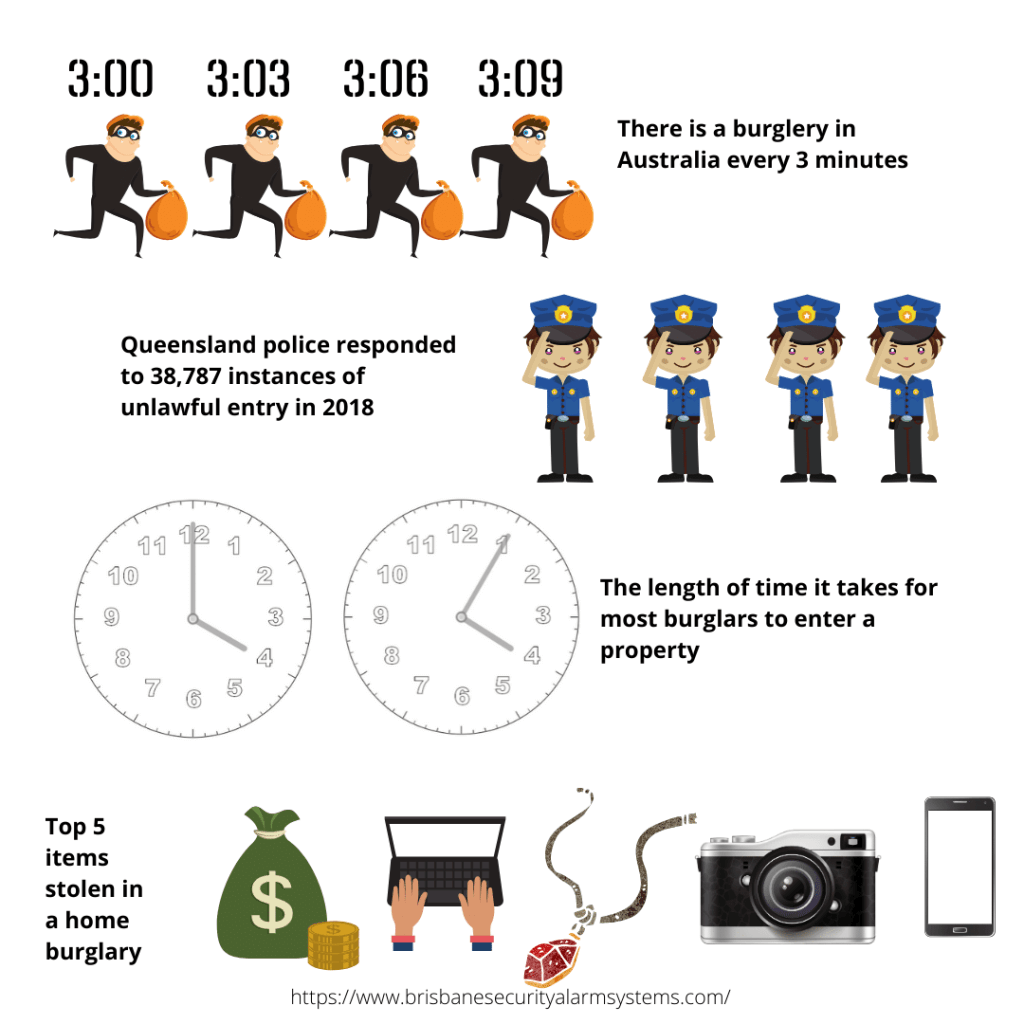Deterrents are key to avoiding a home burglary.
One of the best deterrents is a home alarm system.
Breaking and entering is one of the most common crimes in Queensland. Skip to halfway down the page if you want to find out how to avoid burglaries. For the rest of us, let’s check out some interesting crime stats first.
In 2018 there were over 38,000 instances of home break ins.
Burglary Figures
- In 2017 there were 225,900 recorded burglaries in Australia. One every 3 minutes.
- In Queensland 2.2% of households have experienced an attempted break in. In 2017 there was a total of 40,700 incidents reported to the local police.
- Interestingly, most burglaries occur during the day. You might imagine burglars would crave the cover of darkness. Not so.
- A 2016 survey revealed that the most common time burglaries occurred was between 12 p.m. and 4 p.m.
- Nighttime burglaries—between 10 p.m. and 6 a.m.—accounted for only about 17% of all burglaries. So while you are at work is when you are likely to be robbed.

An Alarm Will Help
The majority of unlawful break-ins are often crimes of opportunity, where criminals gain entry through an open or unlocked door or window. A working home alarm system would have helped prevent most of these!
It takes only five minutes for most burglars to enter a property.

Queensland police suggest the following these three basic steps to keep your property safe:
- Make it difficult for an offender to gain entry.
- Make it difficult for an offender to exit your home with your property
- Make it unlikely that an offender will want to steal your property (engrave or microdot all items of value, making them difficult to sell or pass on).
How do I prevent a break in?
A home alarm system is the most effective way of keeping your property safe. You can also reduce your risk of burglary by making your home more secure. You can do this in some simple ways that may be cheap or even free to implement. Some examples include:
- Get to know your neighbours. Exchange telephone numbers and keep an eye on each other’s homes. You can reduce prowling, loitering and burglary by reporting suspicious people or vehicles to police.
- Install outside security lights with motion activation
- Join your local Neighbourhood Watch group.
- Even when you are at home, ensure doors and windows are secured, particularly in areas that are unoccupied.
- Before you hire a professional house cleaner or gardener, check all references thoroughly.
- Display signs to say that your home is protected by home security alarm.
- Secure your home when you leave by locking all doors and windows. Many burglars simply enter through an unlocked door or window. Remove keys from internal doors and windows when you are not at home.
- If you have a faulty alarm that frequently goes off, get it fixed immediately and tell your neighbours that it's been repaired. Many people ignore an alarm that goes off regularly.
- When you go out, make it appear you’re at home by leaving lights on and music or the TV playing. You can buy timers to turn lights and devices on and off when you are away.
- Keep cash, keys and valuables out of sight and out of easy reach. The most commonly stolen items are cash, laptops and jewellery.
- Don’t leave notes on the door as they suggest that no one is home.
- Don’t leave a house key under the doormat or a pot plant, in the letterbox or in other obvious places.
- Mark valuable property using the Property Identification System.
- Know which doors and windows you can use as an exit in an emergency, so you can leave quickly and safely.
If you do hear an intruder in the home, don’t risk injury. Dial triple zero (000) at the earliest opportunity, leave the house immediately and go to a neighbour or somewhere safe to contact and wait for police.
If you come home and find your home broken into, report it to the police and do not touch anything. Forensic evidence can easily be destroyed, and it’s important for police to see your home exactly as it was left.